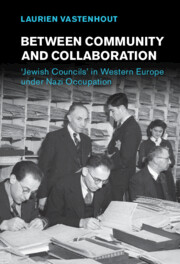Book contents
- Between Community and Collaboration
- Studies in the Social and Cultural History of Modern Warfare
- Between Community and Collaboration
- Copyright page
- Dedication
- Contents
- Illustrations
- Preface
- Abbreviations
- Introduction
- 1 Disrupted Communities?
- 2 Institutional Rivalry and Improvisation
- 3 Leadership of the ‘Councils’
- 4 Optimism and Frustration
- 5 Between Legality and Illegality
- Epilogue
- Bibliography
- Index
2 - Institutional Rivalry and Improvisation
The Establishment of ‘Jewish Councils’ in 1941
Published online by Cambridge University Press: 15 September 2022
- Between Community and Collaboration
- Studies in the Social and Cultural History of Modern Warfare
- Between Community and Collaboration
- Copyright page
- Dedication
- Contents
- Illustrations
- Preface
- Abbreviations
- Introduction
- 1 Disrupted Communities?
- 2 Institutional Rivalry and Improvisation
- 3 Leadership of the ‘Councils’
- 4 Optimism and Frustration
- 5 Between Legality and Illegality
- Epilogue
- Bibliography
- Index
Summary
This chapter deals with the establishment histories of the JR, the AJB, the UGIF-Nord and the UGIF-Sud (the ‘Jewish Councils’ in Western Europe) in 1941. It shows that German officials improvised and copied blueprints from elsewhere, and that rivalry between the various German institutions involved in Jewish affairs affected the form and function of these organisations in Western Europe. It furthermore demonstrates that various German institutions interpreted the exact remit of each of the Jewish organisations differently. As a result, the Jewish organisations in Western Europe were all organised in different ways and all functioned differently, despite the strong German desire to unify anti-Jewish policies. The chapter furthermore examines the impact of the rivalry between the various German institutions on the Jewish organisations, arguing that the increasing influence of the SiPo-SD in the Netherlands, together with an overlap of functions, resulted in a rapid succession of anti-Jewish measures in this country. In Belgium and France, by contrast, institutional rivalry not only hampered the establishment of the AJB and the UGIF, but it also resulted in postponements and, from the German perspective, in a looser grip on the Jewish organisations.
Keywords
- Type
- Chapter
- Information
- Between Community and Collaboration'Jewish Councils' in Western Europe under Nazi Occupation, pp. 56 - 91Publisher: Cambridge University PressPrint publication year: 2022



